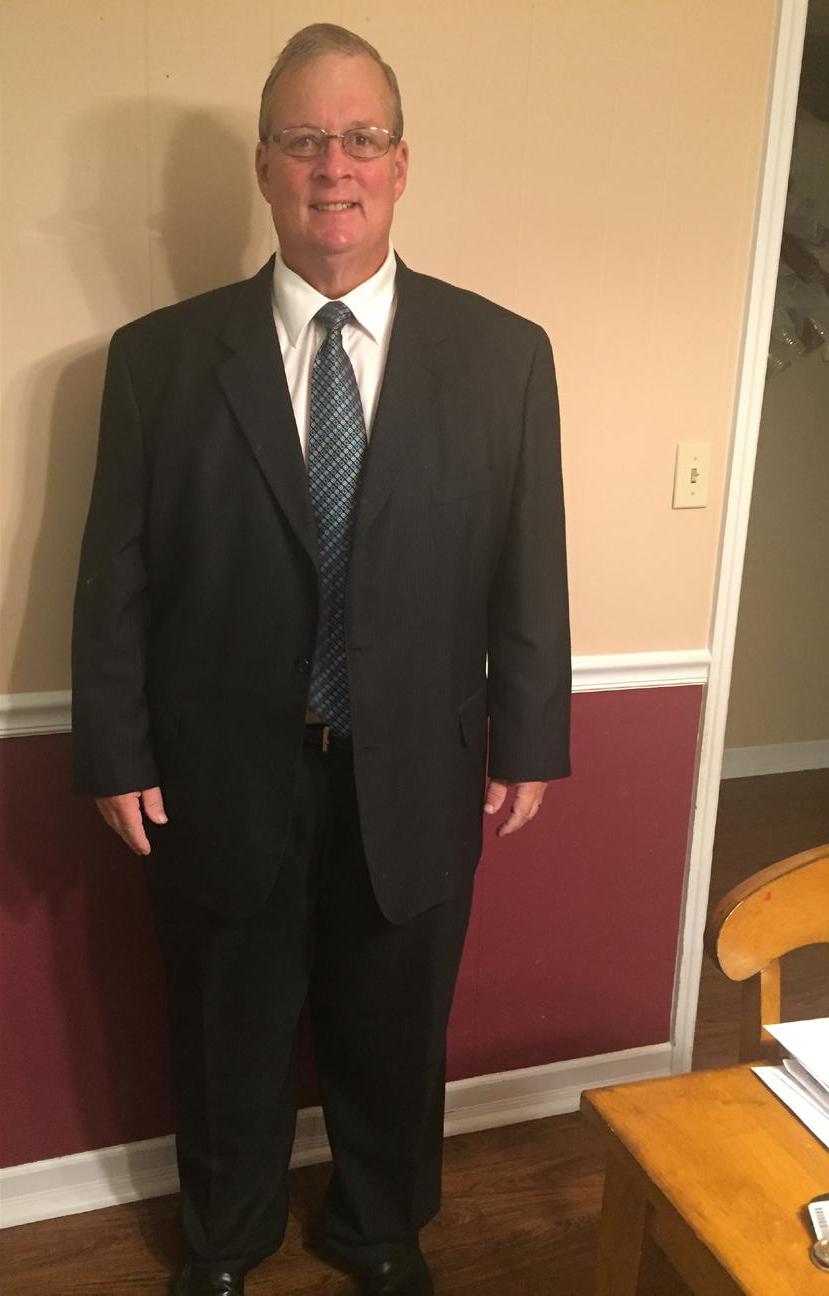An Interview with Barry Cullen & Byron Beck
The average tenure of a pastor in the United States is less than 6 years. In some extraordinary cases, a pastor stays at a single church for all or much of their ministry. Such stability in ministry is not always possible or ideal, but those cases where a pastor spends 30 or 40 years in the same congregation should be celebrated for the commitment to a particular people and a particular calling. Furthermore, these pastors who are called to stay in one congregation for so long have much to teach other pastors about consistency, faithfulness, and intentional freshness in ministry. Byron Beck has been Senior Pastor of Fellowship General Baptist Church in Poplar Bluff, Missouri, since 1987. Barry Cullen has been Pastor of the Providence General Baptist Church in Providence, Kentucky, since 1988. These pastors have seen many changes in their ministry lives. Interim Executive Director Danny Dunivan interviewed them to allow them to talk about their callings and how they have been able to maintain ministry in the same congregations for so many years.
Danny: Tell us about your original sense of calling to ministry. At what moment did you realize you were called to ministry as a pastor?
Barry: I first felt the call to ministry when I was about 14. I was attending church camp, and I believed that the Lord wanted me to preach. I shared with some of the leaders about how the Lord was dealing with me. They prayed for me and encouraged me to go back home and talk to my pastor. However, by the time Sunday arrived I had convinced myself that I was too young for God to use as a preacher and I never mentioned it to my pastor. I was leading music at my home church, and I convinced myself that I was doing enough.
Several years later, at the age of 19, God began to deal with me once again, and I became very burdened. I spoke to a pastor whose opinion I greatly valued. He urged me to follow God’s leading and the next Sunday I announced my calling.
Byron: Calling to the ministry for me, was somewhat “undefined” at first. It began to stir in me about one year after my conversion. I was a senior in high school. I was being discipled through a powerful movement of the Holy Spirit in the McLeansboro First General Baptist Church in McLeansboro, Illinois, and, at the same time, a vibrant high school youth ministry in Carmi, Illinois. I was watching others do ministry and was gradually being invited to serve by people around me. There were two people in particular who saw something in me and encouraged me to listen for God’s voice and His will for my life. It eventually became a slow-growing but unmistakable calling to serve Jesus with all of my life— and, the more I moved into my calling and acted on it, the more it was confirmed for me.
Danny: How would you define the work of a pastor?
Barry: Primarily, I think it is serving as a shepherd to the people God has called you to serve. It is much more than preaching, although that is a big part of it. You are to be a leader, an administrator, a counselor, sometimes an arbitrator, and someone who visits and cares for his people.
Byron: My definition has changed over the years. In my early ministry, it was defined as “preaching, Bible teaching, evangelism, counseling and relational encouraging.” Today, in a larger church with multiple staff, my ministry has shifted from “a farmer to a rancher.” In the past, I DID EVERYTHING MYSELF. If I did not do it, it did not get done. Today, I have to equip and delegate. My more important role is leadership. My ministry has always been shaped by my spiritual gifts and passions, but I am increasingly functioning as an equipper-overseer.
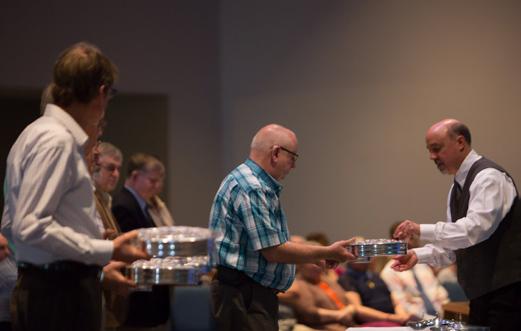

Danny: Have any books (besides the Bible) had a major impact on your ministry?
Barry: Early in my ministry I received a book that, I believe, International Missions sent to our churches called Touch the World Through Prayer by Wesley Duewell. It helped me to understand the power of prayer and how individually and collectively we could reach our communities, and even our world, if we took advantage of it.
Comeback Churches by Ed Stetzer also had an impact on me later in my ministry. I was serving at an older church that had plateaued and even declined. I read the stories of the 300 churches that he profiled in his book. Many of those pastors faced several of the things that I was dealing with, yet they were able to turn their churches around to become vibrant, growing churches. This gave me hope and also insight to help me lead our church to make a “comeback!”
Byron: I have been shaped by the following authors and their books: C.S. Lewis, Josh McDowell, J. Edwin Orr, Chuck Colson, Robert Coleman, David Seamands, Lee Strobel, and Pete Scazzero. Two ministry-related books that I really like are Jeff Henderson’s FOR and Larry Osborne’s Sticky Teams.
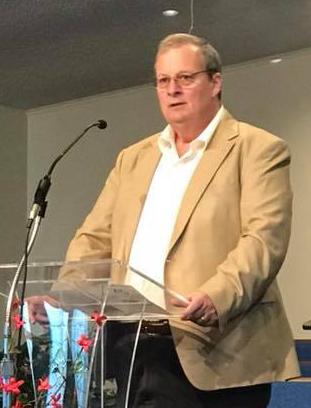
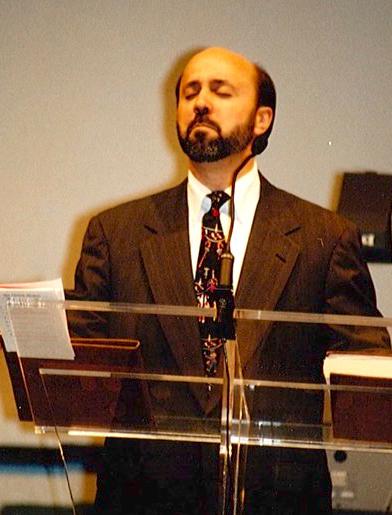

Danny: What Christian leaders/pastors do you read, listen to, or follow now?
Barry: I like Ed Stetzer and Thom Rainer. I also like to read a lot of Carey Nieuwhof’s material; he stretches my thinking quite a bit. I also like some of Steven Furtick’s books, especially Sun Stand Still.
Byron: Sadly, and ironically (and I don’t know what this says about me), but I have been drawn to pastors/ speakers over the years who have ended up experiencing ministry-complicating problems. In each example, I learned a lot from them before their ministries became controversial: Bill Hybels, John Ortberg, David Seamands, Tony Campolo, Mark Driscoll, Rob Bell, and Ravi Zacharias. All of these men were used by God to shape my preaching, my ministry, and my life— and all of them have ended up with varying layers of questions around their ministry. Ugh! Perhaps I should also add that NO author/pastor/teacher is perfect, and if everyone had to be squeaky-clean before God could use them, then we ALL would be invalidated! Over the years I have learned to use a “spiritual filter” while reading any book or listening to any speaker.
Recently, I have been listening to the ministries of Frank Turek, Stephen C. Meyer, Tim Mackie, John Mark Comer, R.C. Sproul, and Andy Stanley. All are effective communicators in their own way.
Danny: How is pastoring today different from when you began in ministry?
Barry: I began pastoring in 1980. Primarily I would preach and visit the sick or those shut-in. In the last few years, it has involved a lot more administration. We’ve been able to add additional staff, which has really helped our church. I’m in more of an overseer position now than I used to be. However, I’ve surrounded myself with some really good staff, and that’s actually made the transition easy.
Since last March, when COVID hit, we had to start doing more virtual ministry. We had already been streaming our services for a while, so we were somewhat prepared. It’s still difficult to not be able to be with all of our congregation “in person.”
Byron: Besides the difference between solo-ministry and staff ministry, the biggest difference has to do with the changing cultural climate. When I started my ministry in the 1970s a pastor’s job was respected in the community by believers and unbelievers. Back then the surrounding culture accepted the Biblical worldview as generally true, even if it did not practice it. Obviously, today is very different.
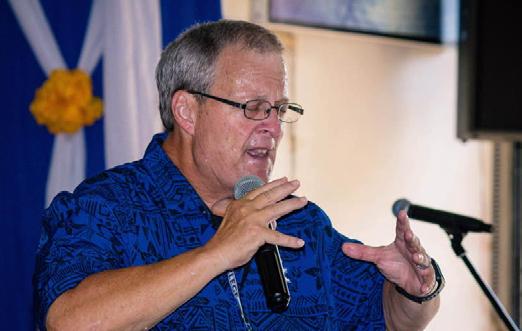

Danny: What advice would you give to a younger pastor just starting out in ministry? Any warnings or encouragements about starting out?
Barry: I would encourage them to try to take advantage of all the educational opportunities they can. They will be thankful for that, in time. Also, don’t forget your family. I speak as someone with experience on this because I thought I was going to lose mine. Sometimes you can get so involved in a ministry that you lose sight of the ones who love you the most.
Byron: If you are beginning your ministry in an established church, I would suggest that your first assignment is to truly learn to love your people — before you try to change them (and/or everything around them). Change comes more easily in an environment built upon love, respect, and trust. Secondly, be patient. Everything does not have to change in the first year. Third, constantly pray with and for your people. Develop a consistent pray plan. Fourth, learn from others. Find an older pastoral mentor, meet regularly, and learn everything you can from them (everything that schooling did not teach you).
Danny: What measures have you taken over the years to avoid some of the things that shipwreck pastors?
Barry: I try not to put myself in situations where it might be easy to fall. If we ruin our reputation, we will lose the ability to minister. I try to stay transparent before my congregation. They need to know that pastors are human and we cope with many of the things they face. It is also good to have friends who will hold you accountable.
Byron: I have always sought to keep priorities in order: (1) Keep my relationship with Jesus real and fresh, (2) The health of my family is more important than my church ministry (honestly, there have been times I lost focus and obsessed with church ministry…apologies to my family). I have intentionally limited nights at church (although emergencies and special seasons interfere). (3) I also do not eat meals or travel in a car alone with a woman who is not my wife, daughter, or relative. Internal/mental/spiritual boundaries (as well as the external ones) are also key. We must not give ourselves permission to imagine ourselves with anyone other than our spouse. (4) Accountability friendships.
Danny How do you keep your preaching fresh? What are your sermon preparation patterns?
Barry: I always try to look for ideas for sermons as I read Christian books, listen to other preachers, and try to stay aware of experiences that my church members may be struggling with in their daily lives where they might need help or encouragement.
I like to know what I’m going to preach on, at least, by the middle of the week. If I’m doing a series, I know several days before that. I try to break my text down to an outline form and then I do research on each of my points using commentaries, word studies, etc. At this point, I try to add illustrations that help reinforce my message and make it applicable to my congregation.
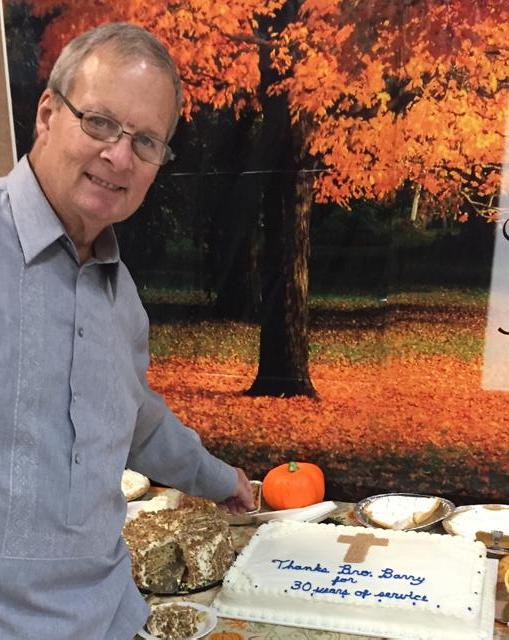
Byron: I am always reading and listening to other great preachers for inspiration and help. If you cannot or will not be a life-long learner, you will not endure. You are not smart enough or spiritual enough “by yourself.” When I listen to another speaker, I continually ask and study: “Why did this message speak to me?”
PREPARATION PATTERNS:
a) I almost always preach sermon series, so I discover in prayer what I am going to preach. The series may run from two weeks to three months.
b) Lay out related Bible texts for each sermon — whether textual or topical.
c) Develop main points for each sermon.
d) Search for high-impact illustrations — stories, quotes, etc.
e) One week out I begin to put my thoughts into manuscript.
f) Along with the manuscript I think visually about sermon slides (Keynote or PowerPoint) that will accompany the verbal message. Because I am a visual learner, this step is very important. I ask: “How can the slide visually enhance what the hearer experiences?” I seek for appropriate pictures to accompany words on the slide.
g) I complete the sermon by Thursday noon. Although the sermon is in manuscript form, I rehearse it multiple times to avoid feeling tied to the manuscript. (We record the online version of the sermon on Thursday afternoon).
h) I will rehearse and tweak it (more or less) before Sunday.
i) I get up at 3:25 a.m. every Sunday to pray, mull over and continue to rehearse the sermon. By now, the manuscript is in the background. The sermon is “in me.”
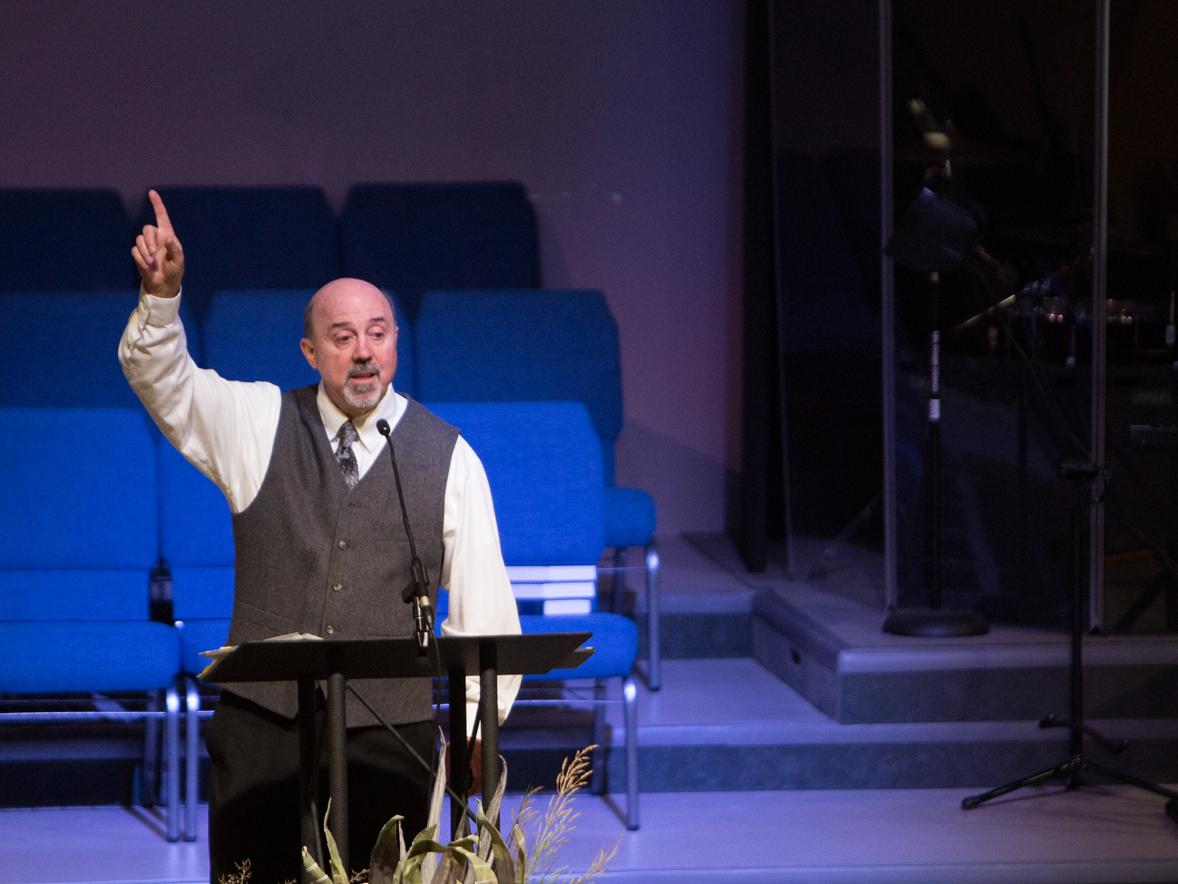
Danny: Can you talk about how you practice spiritual disciplines?
Barry: One of the first things that comes to mind is Bible study. I try to make it my practice every day to read God’s Word. I have tried to read the Bible through each year for several years now, and it always amazes me that I always find something new that I haven’t noticed before.
Prayer is also one of my spiritual disciplines. I think Satan often tries to make me think that I’m too busy to pray. One of my goals is to have a stronger prayer life. I have gotten to the point now, if someone on social media, etc. asks me to pray for them, I try to stop what I’m doing and pray immediately lest, I get busy and I forget. Prayer can be hard work, but it’s worth it! Through prayer, God healed my wife whom the doctors believed had no hope to live! I know it works.
There have been times in my life where I have been led to fast. I’ve gone without food a few days or sometimes I’ve just done without something for a while to discipline my body and spend more time seeking the Lord.
Byron: Daily commitment and variety of style. I read Scripture, sometimes use devotionals, incorporate videos, books, etc. Prayer is key for connection.
Danny: The work of being a pastor outside of the pulpit can come with a heavy load as you carry the concerns of your people. How has this impacted you? How have you remained healthy in the face of it?
Barry: Dealing with the burdens of my congregation has often been difficult. I remember helping a husband and his young children deal with the unexpected death of his wife and their mother. She was a great Christian and very active in our church. I felt like my heart was actually hurting, as I tried to love and minister to them. When someone in their family asked me, “Why did God allow this to happen?’, the best answer that I could give them was, “I don’t know.” I have come to understand that you don’t have to have all the answers if you point people to the Answer, who is Jesus!
Through all of this, I have tried to keep my sense of humor. I have found that laughter, if appropriate, can make it easier to cope with difficult situations.
For many years, I didn’t do a very good job of balancing the needs of my family with those of the congregation. For the last few years, I’ve have been more cognizant of not neglecting my family for ministry. I try to take my vacation time now, whereas I often did not in the past. I have learned to say no to certain things when I sense ministry beginning to encroach on my family time.
Byron: Keeping ministry and life in balance is important. God has given me the ability to not carry other people’s problems home with me. Prayer helps me stay sane.
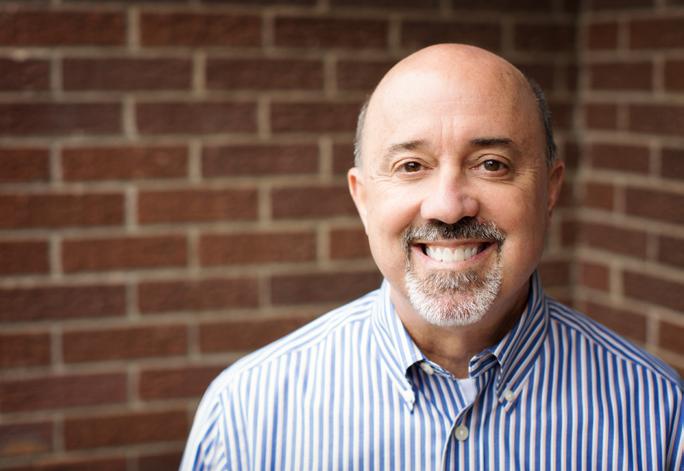
Danny: Can you explain a time when you felt pushed beyond your capabilities as a leader? How did you overcome this difficulty?
Byron: Our church has experienced its share of traumatic moments (a pretty wide variety of wild struggles) over the past 33 years. No doubt about it — my wife has been my most important supporter through all of these. She has given me great advice and helped me maintain perspective. She has allowed me to vent. She has corrected me when I needed it. I cannot thank her or praise her enough for how she has kept me grounded through all of our trials. She has been my perfect teammate!
Barry: There was a time in my ministry where I tried to lead worship, print the church bulletins, preach, and do a lot of other things in the church without asking for help. I believed it was simpler to do this than to take the time to find someone and train them to do it. This often led to a lot of stress. Worry and stress are a couple of things that hinder me spiritually. As I alluded to earlier, we started to add staff at our church. When I surrounded myself with gifted people in the areas of maintaining an office, worship, and children and young peoples’ ministries I had more time and less stress to do what God called me to do.
